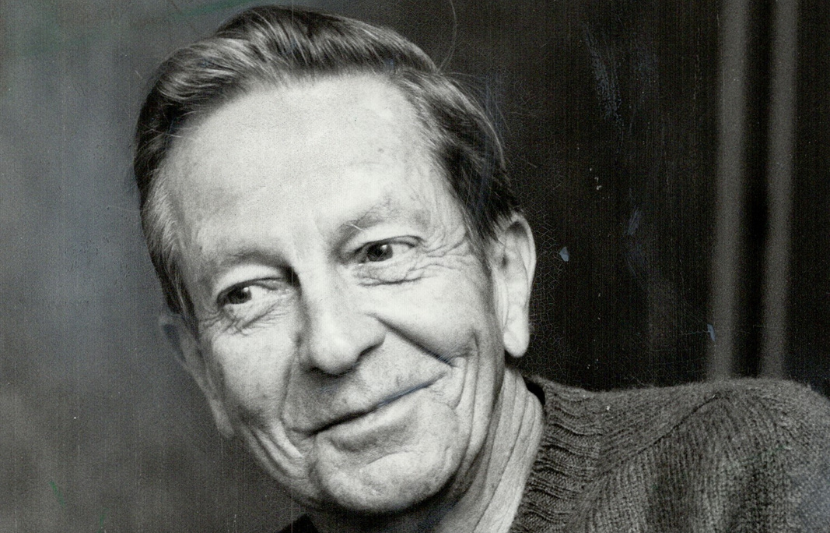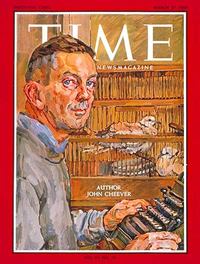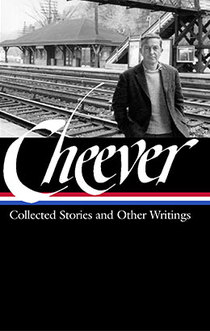
John Cheever (Reg Innell / Toronto Star / Penguin New Zealand)
If you believe in Library of America’s mission and would like to support us in a substantial way, nothing is more helpful than endowing a volume in the series to keep it permanently in print. Your gift will have prominent recognition in the book, and as a Guardian of American Letters you will make a lasting contribution to American culture.
This month’s featured candidate for adoption is John Cheever: Collected Stories & Other Writings, gathering some of the most beguiling short fiction in our nation’s history. Including the entirety of the career-defining The Stories of John Cheever (1978), the LOA edition also contains seven stories originally published in 1943’s The Way Some People Live and seven additional stories that were never collected by the author. These fourteen pieces are no longer available in any other print edition, making Collected Stories the definitive edition of Cheever’s fiction, and an essential stone in the edifice of American literary culture.
Few writers are as synonymous with a specific literary form as John Cheever is with the American short story. Rendering midcentury suburbia with gorgeous prose and an insider’s eye for its social mores, hidden torments, and surreal humor, Cheever placed Westchester on the same map as William Faulkner’s Yoknapatawpha or Mark Twain’s Mississippi: a region of the mind as much as a physical place, suffused with mystery, myth, and history that tells a regionally specific yet universal story about our nation’s character.
In his reflective essay “Why I Write Short Stories,” Cheever remarked on both the perennial commercial underestimation of short fiction and its unique capacity to distill life into transcendent capsules of experience and language. “Who reads short stories?” he asks. “I like to think that they are read by men and women in the dentist’s office, waiting to be called to the chair; they are read on transcontinental plane trips instead of watching a banal and vulgar film spin out the time between our coasts; they are read by discerning and well-informed men and women who seem to feel that narrative fiction can contribute to our understanding of one another and the sometimes bewildering world around us.”
Largely centered on the lives of upper-middle class commuters and their families in the bedroom communities around New York City, Cheever’s greatest stories—“The Swimmer,” “The Country Husband,” “The Five-Forty-Eight”—manage simultaneously to transport us to the hushed cul-de-sacs and leafy side streets of this well-heeled milieu while shedding light on its inhabitants’ hidden dreams, private dramas, and quotidian moments of transcendence. Dubbed “the Chekhov of the suburbs” by New York Times Book Review editor John Leonard (and “the Ovid of Ossining” by Time magazine), Cheever shares with the Russian master the ability to pull into focus the often-blurry zone where vivid realism meets searching, burning emotion.
Consider Francis Weed, father of four, resident of Shady Hill, who survives a plane crash in the opening sentences of “The Country Husband,” only to then embark on one of the tenderest, tawdriest odysseys in American literature. Combining a shocking memory from Weed’s World War II service, an American Beauty–esque infatuation with a teenage babysitter, and the looming threat of social pariahdom, the story is a slow burn building to a quietly transformative ending, in which Francis’s unruly inner desires find an unexpected counterpoint in the reassuring rhythms of his suburban idyll. Vladmir Nabokov, no stranger to the complexities of lust and decorum, called it “a miniature novel, beautifully traced.”

Burt Lancaster as Ned Merrill in The Swimmer (dir. Frank Perry, 1968).
In “The Swimmer,” perhaps Cheever’s best-known story (it was adapted for a 1968 film starring Burt Lancaster), the fractured inner life of Ned Merrill issues forth a startling vision of a suburban landscape that transforms his neighbors’ swimming pools into a “river” Merrill chooses to navigate solo one midsummer Sunday. The novelist Michael Chabon calls it “a masterpiece of mystery, language and sorrow. It starts out, on a perfect summer morning, as the record of a splendid exploit … and ends up as a kind of ghost story.” Like so many of Cheever’s works, there is no predicting the course the narrative will take despite its trappings of familiarity and superficial normalcy. Before we know it, we are infinitely far from where our assumptions would have led us, in an uncharted territory that borders on myth.

John Cheever on the cover of Time magazine, March 27, 1964
A vital part of the American cultural firmament, these endlessly re-discoverable gems have lost none of their magnetic power and deserve to be permanently available for future generations of readers. Now is your chance to make a mark on American literary history. A fully tax-deductible contribution of $75,000 to the Guardians of American Letters Fund will help to keep this essential volume in print—an enduring testimony to Cheever’s astonishing achievement and to your generous gift. Guardians and individuals they designate are recognized on a special acknowledgment page in the front of the volume of their choice, and this acknowledgment will appear in every future printing of the book.
Learn more about becoming a Guardian of American Letters.
• Donors to the Guardians of American Letters Fund
• Complete list of titles available for adoption
Gifts to LOA in any amount are profoundly appreciated and help support our nonprofit mission to ensure that great American writing is discovered, made available, and celebrated. Please consider making a donation at this link.




